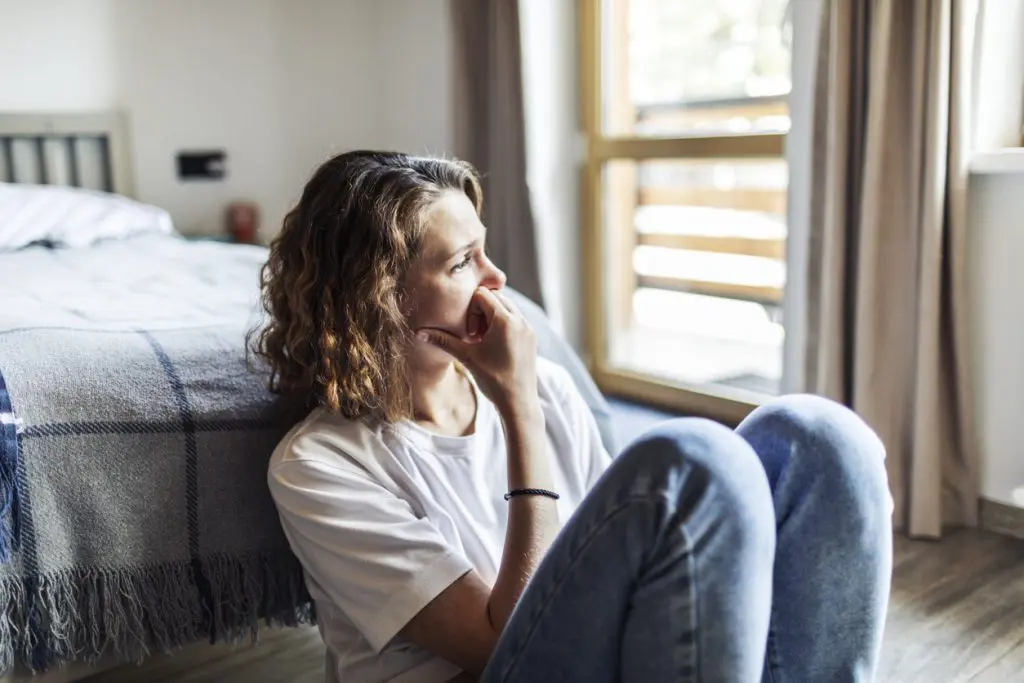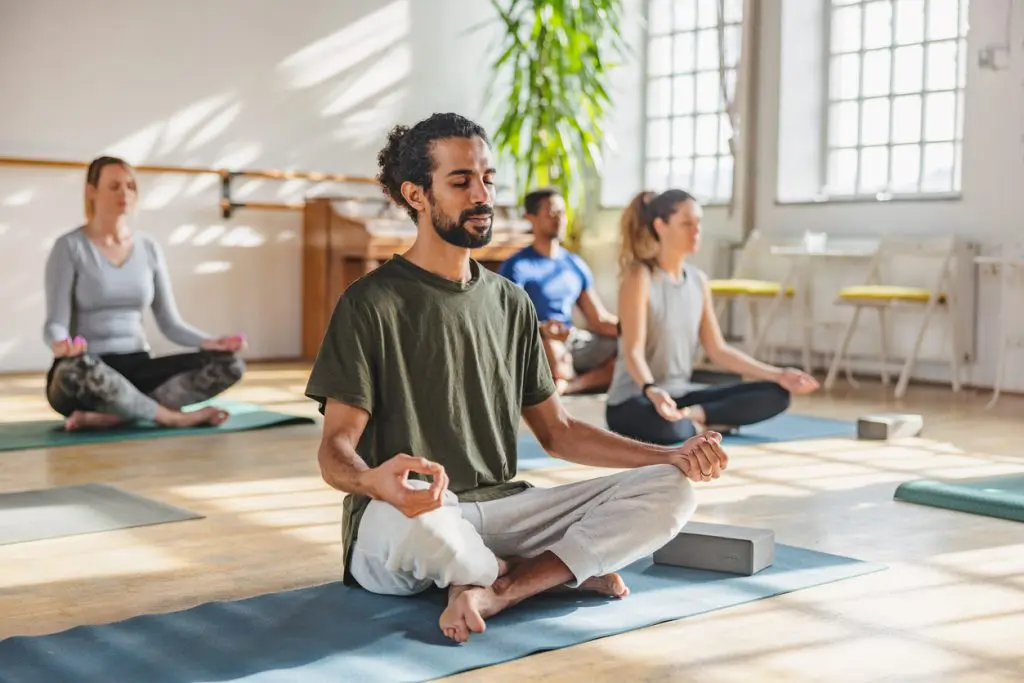Anxiety is a prevalent and often overwhelming experience for many Americans today, impacting millions across various age groups and backgrounds. Defined as a natural response to stress, anxiety can manifest in different forms, from persistent worrying and fear to physical symptoms like rapid heartbeat and restlessness. According to the Anxiety and Depression Association of America (ADAA), anxiety disorders affect approximately 40 million adults in the United States each year, making it the most common mental health issue nationwide.
Managing anxiety effectively is crucial not only for mental well-being but also for overall health and quality of life. In this comprehensive guide, we will explore fourteen proven strategies tailored to help you alleviate anxiety symptoms and regain a sense of control. From understanding anxiety triggers and implementing lifestyle changes to exploring relaxation techniques, cognitive behavioral strategies, and seeking professional help, each tip is aimed at empowering you to take proactive steps towards a calmer, more balanced life. Whether you’re seeking immediate relief or long-term management strategies, this guide will equip you with the tools and insights needed to navigate anxiety with confidence and resilience.

1. Understanding Anxiety:
Understanding the nature of anxiety is fundamental to effectively managing it. Anxiety is more than just occasional stress—it’s a persistent feeling of worry, fear, or apprehension that can significantly impact daily life. Common symptoms include excessive worrying, restlessness, difficulty concentrating, and physical symptoms like muscle tension or insomnia. It’s important to recognize that anxiety disorders can vary widely in their intensity and specific symptoms, from generalized anxiety disorder (GAD) to phobias and panic disorders.
To address anxiety effectively, start by familiarizing yourself with its various forms and how they may manifest in your life. Consider the following points:
- Types of Anxiety Disorders: Identify whether you experience generalized anxiety, social anxiety, panic attacks, or specific phobias, as each may require tailored approaches for management.
- Symptom Recognition: Pay attention to both emotional and physical signs of anxiety, such as racing thoughts, irritability, sweating, or digestive issues.
- Triggers and Patterns: Reflect on situations or environments that tend to exacerbate your anxiety, helping you pinpoint potential triggers to avoid or manage more effectively.
By understanding these aspects of anxiety, you can better equip yourself with the knowledge needed to implement targeted strategies and seek appropriate support to alleviate its impact on your life.
2. Lifestyle Changes:
Making strategic lifestyle adjustments can play a significant role in managing anxiety levels over the long term. Diet, exercise, and overall self-care practices can all contribute to a calmer mind and body. Consider these key factors:
- Nutrition: A balanced diet rich in fruits, vegetables, lean proteins, and whole grains can support mental health by providing essential nutrients and stabilizing blood sugar levels. Certain foods, like those high in omega-3 fatty acids (e.g., salmon, flaxseeds), can have mood-stabilizing effects.
- Physical Activity: Regular exercise is known to reduce anxiety by releasing endorphins and lowering levels of stress hormones like cortisol. Aim for at least 30 minutes of moderate exercise most days of the week, whether it’s brisk walking, cycling, yoga, or other activities you enjoy.
- Sleep Quality: Quality sleep is crucial for mental health. Establish a consistent sleep schedule, create a relaxing bedtime routine, and ensure your sleep environment is conducive to rest. Avoid caffeine and electronics before bed to promote better sleep hygiene.
Incorporating these lifestyle changes can not only help alleviate current anxiety symptoms but also promote overall well-being and resilience in the face of stress. By prioritizing your diet, physical activity, and sleep habits, you empower yourself with proactive strategies for managing anxiety effectively.
3. Relaxation Techniques:
Incorporating relaxation techniques into your daily routine can provide immediate relief from anxiety and help cultivate a sense of calm and inner peace. These practices are designed to reduce stress levels and promote relaxation of both the mind and body. Consider the following effective techniques:
- Deep Breathing Exercises: Practice deep breathing techniques such as diaphragmatic breathing or belly breathing. This involves taking slow, deep breaths to activate the body’s relaxation response and calm the nervous system.
- Progressive Muscle Relaxation (PMR): PMR involves tensing and then relaxing different muscle groups sequentially, promoting awareness of tension and relaxation throughout the body. This technique can help reduce physical symptoms of anxiety, such as muscle tension.
- Mindfulness Meditation: Mindfulness meditation encourages focused attention on the present moment without judgment. It can help increase awareness of thoughts and feelings, reduce stress, and improve emotional regulation.
These relaxation techniques can be practiced individually or in combination, depending on your preferences and lifestyle. Incorporating them into your daily routine, even for just a few minutes a day, can significantly reduce anxiety levels and enhance overall well-being. Whether you’re seeking immediate relief or long-term management strategies, these techniques offer accessible and effective ways to manage anxiety in everyday life.
4. Cognitive Behavioral Strategies:
Cognitive behavioral strategies, rooted in the principles of psychology, are highly effective for managing and reducing anxiety by addressing negative thought patterns and behaviors. This approach focuses on changing the way you think and behave in response to anxiety-provoking situations. Key strategies include:
- Cognitive Restructuring: Identify and challenge irrational or negative thoughts that contribute to anxiety. Replace them with more balanced and realistic thoughts to reduce anxiety levels.
- Exposure Therapy: Gradual exposure to feared situations or triggers under controlled conditions can help desensitize anxiety responses over time. This technique is particularly effective for specific phobias and social anxiety.
- Behavioral Activation: Engage in activities and behaviors that bring a sense of accomplishment and pleasure, even when you don’t feel like it. This can help counteract feelings of lethargy and withdrawal associated with anxiety.
Cognitive behavioral strategies often involve working with a therapist trained in CBT techniques, but many tools and resources are available for self-help as well. Books, online courses, and apps can guide you through exercises and techniques to apply CBT principles in your daily life. By learning and practicing these strategies, you can gain greater control over your thoughts and behaviors, leading to reduced anxiety and improved overall well-being.
5. Mindfulness and Meditation:

Mindfulness and meditation practices are powerful tools for reducing anxiety by fostering present-moment awareness and promoting relaxation. These techniques originate from ancient traditions but are increasingly recognized in modern psychology for their therapeutic benefits. Here’s how you can incorporate mindfulness and meditation into your routine:
- Mindfulness Practice: Cultivate mindfulness by paying attention to sensations, thoughts, and emotions in the present moment without judgment. Mindfulness helps break the cycle of worry and rumination associated with anxiety.
- Meditation Techniques: Explore different meditation techniques such as guided meditation, focused attention meditation (e.g., on your breath or a mantra), or loving-kindness meditation. These practices can calm the mind, reduce stress, and enhance emotional resilience.
- Mindfulness-Based Stress Reduction (MBSR): Consider enrolling in an MBSR program, which combines mindfulness meditation and yoga to reduce stress and improve overall well-being. These programs are often available online or through local wellness centers.
By integrating mindfulness and meditation into your daily routine, you can develop skills to manage anxiety more effectively over time. Whether you practice for a few minutes each day or attend structured programs, mindfulness and meditation offer accessible and evidence-based approaches to promote mental health and emotional balance.
6. Social Support:
Building and maintaining a strong support network is crucial for managing anxiety and improving overall well-being. Social connections provide emotional support, practical assistance, and a sense of belonging, all of which can help alleviate anxiety symptoms. Consider the following strategies to enhance your social support system:
- Identify Supportive Relationships: Surround yourself with people who are understanding, empathetic, and supportive of your journey to manage anxiety. This may include family members, friends, colleagues, or support groups.
- Open Communication: Be open about your feelings and experiences with trusted individuals. Sharing your concerns and receiving validation can reduce feelings of isolation and anxiety.
- Join Support Groups: Consider joining local or online support groups specifically for anxiety. These groups offer a safe space to share experiences, learn coping strategies from others, and receive encouragement.
- Engage in Social Activities: Participate in social activities and hobbies that bring you joy and allow for meaningful interactions with others. This can help distract from anxious thoughts and foster positive emotions.
By nurturing positive relationships and seeking support when needed, you can create a supportive environment that promotes emotional resilience and reduces anxiety. Remember, social support is a valuable resource in times of stress and can significantly contribute to your overall mental health and well-being.
7. Sleep Hygiene:
Quality sleep is essential for managing anxiety and promoting overall mental health. Establishing good sleep hygiene practices can significantly impact your ability to cope with stress and reduce anxiety levels. Consider the following tips to improve your sleep hygiene:
- Consistent Sleep Schedule: Go to bed and wake up at the same time every day, even on weekends, to regulate your body’s internal clock.
- Create a Relaxing Bedtime Routine: Develop a calming bedtime routine to signal to your body that it’s time to wind down. This may include activities like reading, taking a warm bath, or practicing relaxation techniques.
- Optimize Your Sleep Environment: Make your bedroom conducive to sleep by keeping it cool, dark, and quiet. Use comfortable bedding and consider using blackout curtains or a white noise machine if needed.
- Limit Stimulants and Electronics: Avoid caffeine and nicotine close to bedtime, as they can interfere with sleep. Additionally, limit screen time and exposure to electronic devices before bed to promote relaxation.
By prioritizing sleep hygiene, you can enhance the quality and duration of your sleep, which in turn supports better mental health and reduces anxiety levels. Incorporating these practices into your nightly routine can lead to improved overall
well-being and resilience in managing anxiety.
8. Setting Boundaries:
Setting boundaries is crucial for managing anxiety and protecting your mental health in relationships, work, and daily life. Boundaries define what is acceptable and what is not, helping you maintain emotional and physical space that promotes well-being. Consider the following strategies for setting and maintaining boundaries:
- Identify Your Limits: Reflect on your personal needs, values, and priorities to determine where boundaries are necessary. This may include time, energy, emotional resources, or physical space.
- Communicate Clearly: Clearly communicate your boundaries to others in a respectful and assertive manner. Use “I” statements to express your needs and expectations without blaming or criticizing.
- Learn to Say No: Practice saying no to requests or demands that exceed your capabilities or compromise your well-being. Asserting your boundaries helps prevent resentment and burnout.
- Consistency is Key: Consistently enforce your boundaries and be prepared to uphold them, even when faced with resistance or discomfort. Remember that setting boundaries is a form of self-care and self-respect.
By establishing and maintaining healthy boundaries, you can reduce stress, improve relationships, and protect your mental health. Setting boundaries allows you to prioritize your needs and well-being, fostering a sense of empowerment and control over anxiety-provoking situations.
9. Time Management:

Effective time management is essential for reducing anxiety by helping you prioritize tasks, set realistic goals, and maintain a balanced schedule. By managing your time more efficiently, you can reduce stress levels and improve productivity. Consider the following time management strategies to help alleviate anxiety:
- Prioritize Tasks: Identify and prioritize tasks based on urgency and importance. Focus on completing high-priority tasks first to reduce feelings of overwhelm.
- Set SMART Goals: Set specific, measurable, achievable, relevant, and time-bound (SMART) goals to guide your daily and long-term activities. Break larger tasks into smaller, manageable steps to facilitate progress.
- Create a Schedule: Develop a daily or weekly schedule that allocates time for work, leisure, self-care, and relaxation. Stick to your schedule as much as possible to maintain consistency and reduce procrastination.
- Limit Multitasking: Avoid multitasking, as it can increase stress and reduce productivity. Focus on one task at a time and allocate dedicated time blocks for concentrated work.
- Learn to Delegate: Delegate tasks when appropriate and seek support from others to lighten your workload. Delegating responsibilities can free up time for activities that promote relaxation and well-being.
By implementing effective time management techniques, you can enhance your productivity, reduce anxiety, and achieve a greater sense of control over your daily life. Prioritizing tasks, setting goals, and maintaining a balanced schedule contribute to overall well-being and resilience in managing anxiety.
10. Assertiveness Training:
Assertiveness training is a valuable skill for managing anxiety by helping you communicate effectively, set boundaries, and advocate for your needs and rights. Assertive behavior involves expressing your thoughts, feelings, and preferences in a respectful and confident manner, without infringing on the rights of others. Consider the following strategies to develop assertiveness and reduce anxiety:
- Understand Assertiveness: Learn about the principles of assertiveness, including the difference between assertive, aggressive, and passive communication styles. Assertiveness involves advocating for yourself while respecting the perspectives of others.
- Practice Assertive Communication: Practice assertive communication techniques, such as using “I” statements to express thoughts and feelings, making direct requests, and setting clear boundaries. Role-play scenarios to build confidence in asserting yourself in various situations.
- Learn to Manage Conflict: Develop skills for managing conflict constructively, including active listening, empathetic responses, and problem-solving techniques. Addressing conflicts assertively can reduce anxiety and promote positive resolutions.
- Build Self-Confidence: Cultivate self-confidence and self-esteem through positive self-talk, setting achievable goals, and celebrating your accomplishments. Assertiveness is rooted in self-assurance and belief in your ability to express yourself effectively.
By practicing assertiveness and advocating for your needs, you can reduce anxiety, improve relationships, and assert your rights in various aspects of life. Assertive communication fosters mutual respect and understanding, contributing to enhanced well-being and confidence in managing anxiety.
11. Creative Expression:
Engaging in creative expression is a therapeutic outlet for managing anxiety by channeling emotions, promoting self-discovery, and fostering relaxation. Creative activities allow you to express thoughts and feelings in a non-verbal and imaginative way, providing a sense of catharsis and emotional release. Consider the following creative outlets to reduce anxiety and enhance well-being:
- Art Therapy: Explore art therapy techniques, such as painting, drawing, sculpting, or collage-making, to express emotions and reduce stress. Art therapy promotes self-expression and mindfulness through creative processes.
- Writing and Journaling: Keep a journal or engage in writing activities, such as poetry, storytelling, or reflective writing. Writing allows you to explore thoughts and feelings, gain perspective, and process experiences in a structured and therapeutic manner.
- Music and Dance: Listen to music or engage in dance and movement activities to uplift your mood, release tension, and promote relaxation. Music therapy can enhance emotional regulation and reduce anxiety symptoms.
- Crafting and DIY Projects: Participate in crafting, DIY projects, or hobbies such as knitting, woodworking, or gardening. Engaging in hands-on activities fosters concentration, creativity, and a sense of accomplishment, which can alleviate anxiety.
By incorporating creative expression into your daily routine, you can tap into your inner creativity, reduce stress levels, and cultivate a positive outlet for managing anxiety. Creative activities promote emotional well-being, self-discovery, and relaxation, contributing to a holistic approach to anxiety management.
12. Setting Realistic Expectations:
Setting realistic expectations is essential for managing anxiety by reducing pressure, fostering self-compassion, and promoting a balanced perspective on achievements and setbacks. Unrealistic expectations can contribute to stress, perfectionism, and feelings of inadequacy. Consider the following strategies to set realistic expectations and alleviate anxiety:
- Identify Your Values: Clarify your values, priorities, and long-term goals to guide your expectations and decisions. Align expectations with what truly matters to you and reflects your personal values.
- Break Tasks into Manageable Steps: Break larger goals or projects into smaller, actionable steps to facilitate progress and reduce overwhelm. Focus on making steady progress rather than striving for perfection.
- Practice Self-Compassion: Cultivate self-compassion by treating yourself with kindness and understanding, especially during challenging times or when facing setbacks. Accept imperfections and mistakes as part of the learning and growth process.
- Learn to Adapt: Be flexible and adaptable in adjusting expectations based on changing circumstances or unforeseen challenges. Embrace resilience and problem-solving skills to navigate uncertainties with confidence.
By setting realistic expectations, you can reduce anxiety, enhance self-esteem, and foster a healthy balance between ambition and self-care. Adjusting expectations to align with your values and capabilities promotes well-being and resilience in managing anxiety effectively.
13. Healthy Coping Mechanisms:
Developing healthy coping mechanisms is essential for managing anxiety by promoting resilience, reducing stress, and fostering adaptive responses to challenges. Healthy coping strategies empower you to navigate difficult emotions and situations effectively. Consider the following techniques to cultivate healthy coping mechanisms and alleviate anxiety:
- Mindfulness and Relaxation: Practice mindfulness meditation, deep breathing exercises, or progressive muscle relaxation to calm the mind and body, reduce stress, and enhance emotional regulation.
- Physical Activity: Engage in regular exercise, such as walking, jogging, yoga, or dancing, to release endorphins, reduce anxiety, and improve overall well-being. Physical activity promotes relaxation and enhances mood.
- Creative Expression: Explore creative outlets, such as art therapy, writing, music, or crafting, to channel emotions, promote self-expression, and foster relaxation. Creative activities provide a therapeutic and enjoyable way to reduce anxiety.
- Social Support: Seek support from friends, family members, or support groups to share experiences, receive encouragement, and feel connected. Social support enhances resilience and reduces feelings of isolation or loneliness.
- Healthy Lifestyle Habits: Maintain a balanced diet, prioritize sleep hygiene, and avoid substances like alcohol or drugs that can exacerbate anxiety symptoms. A healthy lifestyle supports overall well-being and resilience in managing anxiety.
- Professional Support: Consult with a mental health professional, such as a therapist or counselor, to explore treatment options, learn coping skills, and receive personalized support for managing anxiety effectively.
By incorporating healthy coping mechanisms into your daily routine, you can build resilience, reduce anxiety, and improve overall well-being. Developing adaptive strategies empowers you to navigate challenges with confidence and maintain a balanced approach to mental health.
14. Developing a Long-Term Plan:
Creating a long-term plan for managing anxiety involves establishing sustainable habits and strategies that promote ongoing mental health and well-being. By taking proactive steps and maintaining consistency, you can reduce anxiety symptoms and build resilience over time. Consider the following guidelines when developing your personalized long-term plan:
- Self-Assessment: Reflect on your current stressors, triggers, and coping mechanisms to identify areas for improvement.
- Goal Setting: Set realistic and achievable goals related to anxiety management, such as reducing worry frequency, improving sleep quality, or practicing relaxation techniques regularly.
- Healthy Lifestyle Habits: Prioritize activities that promote physical and mental health, such as regular exercise, balanced nutrition, adequate sleep, and mindfulness practices.
- Regular Monitoring: Track your progress by journaling, using mood tracking apps, or reviewing your long-term goals periodically to stay motivated and adjust strategies as needed.
- Professional Support: Maintain regular check-ins with a mental health professional, such as a therapist or counselor, to receive guidance, monitor progress, and adjust treatment plans as necessary.
By implementing a comprehensive long-term plan tailored to your needs and preferences, you empower yourself to effectively manage anxiety and enhance overall quality of life. Consistency and dedication to
self-care promote resilience and sustainable well-being in navigating life’s challenges.
Conclusion
Managing anxiety is a journey that requires patience, self-awareness, and proactive strategies. By incorporating these fourteen proven techniques into your daily routine, you can reduce anxiety symptoms, cultivate resilience, and improve overall well-being. Whether you’re focusing on understanding anxiety triggers, implementing lifestyle changes, practicing relaxation techniques, or seeking professional support, each strategy plays a crucial role in promoting mental health and emotional balance.
Remember, managing anxiety is not a one-size-fits-all approach. It’s essential to explore different techniques, adapt them to your unique needs, and seek support when necessary. By taking proactive steps and prioritizing your mental health, you can navigate anxiety with confidence and resilience. Embrace the journey of self-discovery and growth as you build a toolkit of strategies to support your well-being and live a fulfilling life free from overwhelming anxiety.






